- Home
- G. Wells Taylor
The Forsaken - The Apocalypse Trilogy: Book Two Page 2
The Forsaken - The Apocalypse Trilogy: Book Two Read online
Page 2
This was the first day of a Standing rain that fell on the heels of three blissful days of Desert. The cloud cover was low, wrapping the tallest buildings in darkness where they protruded from the Carapace—a mammoth patchwork of waterproof materials inlaid with intricate channels and reservoirs. It was added decades before to funnel the tons of water that fell each day and to protect construction workers who coaxed the city skyward. It was dark and gleamed dully with moisture. Humped in places, massive sections of convex graphite and plastic were interconnected by cables and constantly winched upward to keep pace with the City’s growth. It offered poor protection, being tattered in places by savage winds, and was under constant repair. It looked like the broken shell of an ancient monster.
Life in the City was hidden. At first glance, the City of Light’s name appeared to be a misnomer since the glass skins of its many skyscrapers reflected weak gray in the daytime and flickering streetlight at night. At second, having gauged the spirits of its inhabitants, the name would be exposed as a marketing ploy and little more. Perhaps there had been a time when light of a physical or metaphysical nature existed there; but no more.
Beneath the Carapace, the City contained within its soaring gothic arches the very best and last of what humanity had to offer the world after the Change. True there were other cities, other living strongholds in what remained of Europe, Asia, Africa and others; but none could challenge the grandeur that the City boasted. The last of the best resided there, as safe as any could be in the madness that life had become. Most believed that the end had arrived—that human history had halted, others thought some new and terrible age free of human domination was upon them all. Only the insane, faithful and foolish still believed that the Change heralded a new beginning. But the Change had come, and in time so had the City.
The City of Light was the offspring of the dead island-city that now protruded from the Eastern Sea some few miles from shore. This had been flooded out by the storms that followed the Change, and never recovered. Global Warming accelerated not long after the Millennium turned, when the clouds had rolled in, the rain began to fall, and the waters of the earth rose up to permanently drown the world’s coastal cities.
The City of Light had its humble beginning as a mainland borough of the metropolis now submerged. The jagged corpse of its parent could still be seen rising above the water. Though it was impossible to lay the blame on the ocean alone. The early days had seen a valiant stand made by its citizens—massive dikes were built that held. But then came the terror of the rising dead, the horror of the true believers and the violence of the everlasting Jihad. And the fear set fires, and what remained burned before it flooded. The ruins were still inhabited some said, but none who went there returned to say by whom.
The City of Light’s enormous perimeter was guarded by fifty-foot cyclopean walls on the north, west and south, and claimed the sea as its guardian to the east. In its early years, the City had grown outward for many miles, spreading up and down the coast, and marching inland unchecked until its edges scraped terrifyingly against the vast wilderness that was growing there. Something primal happened then, as though the denial that any growth represented could not overpower the truth of what the mainland had become. So much had changed in the world, that the City’s designers were possessed of no valiant response, only the gut reaction of throwing up the walls.
With a perimeter defined by fear, the City of Light had nowhere to go but up. Its early leaders easily covered their cowardice with triumphant words and phrases. “Now marks the ascent of humanity.” Decades after the Change the City’s fathers had laid claim to all the land that once had been North America, and since its population was now disorganized or dead, there were none to argue against the outright exploitation of its vast resources. So the inland cities and states were used as raw material and the City climbed into the sky.
The City of Light grew rapidly. After the disenfranchised millions had salvaged what they could, they abandoned their sinking island city and flocked to the shores to set about constructing new homes for themselves—building on and expanding what they found there. Following the raising of the walls, some twenty years after the Change, ground level had grown dangerously overpopulated and construction began on another level that arched over it on massive legs of steel and concrete. New structures were built upon this, casting ground level into darkness—but electrical power was plentiful then, and city people were acclimated to artificial light.
Survivors kept coming from all points of the compass, and soon this first level was filling to claustrophobic proportions. A second level was constructed, and more buildings launched into the sky on top of this. Another twenty years and then fifty more passed. Level after level was added as the inland population traveled to the coast for sanctuary—their smaller towns and cities dying under the onslaught of the Change.
Years later, long after high prices and scarcity had dimmed reliable electric light for any but the wealthy, the City’s original landscape on its lowest levels was lost. Where its first streets and neighborhoods had been now lurked trackless shadowy paths—ground level had been renamed “Zero.” The oldest buildings had become massive foundations for the terrifying towers built upon them. The City of Light continued its charge upward at the endless gray. Construction was unabated, no sooner would a tower be finished and incorporated into the Carapace, than its designers would begin the blueprints for its expansion.
Such constant, rampant physical delineation and disparity encouraged a social twin. The poor were relegated to the City’s lowest levels: Zero, One and Two. Three and Four were for the middle class. The highest from five to seven were reserved for the rich and powerful. Over the dark shrouded streets alternately hugging the upper levels and swooping down to the streets below were built the arching Skyways, flying ribbons of concrete and asphalt that kept the City’s sky-dwelling citizens from having to lower themselves to the levels and populace that dwelled below. And so skyscraper was built on skyscraper, and tower upon tower. Ever upward the City flung itself, as though its populace feared the very earth that had birthed it.
4 – The Power of Pain
The assassin was not a religious man. Stroking out his final hundred pushups he focused on the primal forces that kept him alive. Metaphysical muttering did nothing to augment his formidable survival skills. There was more truth in the pools of sweat that had formed around his straining hands than could be found between the covers of the Bible or other religious work. And so spare was his existence, so dependant upon the unobstructed view was he that anything that did not directly assist him in staying alive was rejected outright.
Instead he honed his mind and body like a knife—whetting its edge on any obstacle life threw at him. He had to be the perfect machine to interact with other tools—the weapons of his trade. And he was the integral part—the engine for the killing systems he had designed. Religion and philosophy encouraged irrational thinking, and he had no use for it. The closest he possessed to a spiritual life was his knowledge of pain.
He was exposed to its power before he could talk, and had since depended upon it as his sole employer and greatest teacher. He didn’t consider himself able to possess faith in anything else. The assassin had moved through his life with hard actions in an environment too strenuous for anything metaphysical to survive. He was a contract killer. He killed, and tried to stay alive in the process. Childhood had hardened him to viciousness, and from it he had learned to give and receive violence while gaining a tangible thrill from both activities. That was the power of pain. It punished and it rewarded. There was something reassuring in the assertion of his dominance. It was a pleasure killing people who would kill him and he received great gratification from the blows he absorbed in return. Pain was life.
The assassin used the pain he absorbed rather than shun it. Early on, he understood the importance of making himself one with reality. His survival depended on that. Life was pain. He never tried to convince himself tha
t as he dealt out violence he dealt out knowledge. The power of pain was different. His was a business that was unforgiving to men who flinched. He had to be prepared to take a hit if he wanted to survive long enough to kill his target. A heavy caliber bullet snapping against a Kevlar vest and breaking the ribs beneath hurt, but if he was not prepared to accept the pain—he might miss his own shot, and his prey in turn would get the advantage and he would die. That was the essential equation of his life. Pain punished cowardice and rewarded conviction.
Distantly he could remember the face of his father—the high priest of pain—howling with fury as he administered this arcane knowledge with fists. But those earliest glimpses of the power were so entwined with ancient anger and emotion that they were dangerous, and so discarded. Regardless, the exquisite purity of the pain inherent in those harsh lessons was an integral part of the man he had become. It had survived his transition from the old life to the new—from the world before the Change, into the world that came after.
Before the Change he had made his money killing wayward husbands and wives, faithless gangsters and faithful policemen and politicians. The money was good in those bygone days, and kills more gratifying. There was satisfaction in a hunt that took skill and risk that finished with a corpse that stayed dead. The power of pain made sense then and he had luxuriated in its might. But the Change had altered that. With the rising of the dead had come a change in business, and a loss of control. Since he could no longer earn money killing as a punishment or for silence he found that he could not exploit his talent to the fullest and he sank slowly into a depression that his darkest violence could not break.
He tried to pull himself from it. His killing became more extravagant, more vicious and bloody with little spiritual impact. A target could be silenced, but the process would better suit a butcher than a professional gun. The Change seemed to be more powerful than pain. And for a time he tried to combat this growing impotence by taking greater chances with his work. Finally, he was forced to peer into the dim recesses of himself—to try to unlock the mystery of this power—this power that had seemingly deserted him.
It was through this contemplative approach that he had found the light—or it was the opposite of light—though even that was a misnomer for it was not darkness either. His brain simply lacked the sensory apparatus to explain or categorize what he found. He responded with ambiguous descriptions that fell far short of the truth. It was a black illumination—a full emptiness. It was everywhere and nowhere. Finally, it was invisible until seen from the darkest place in his soul—a place where there was no language. Then, even as he applied his first inept words to the paradox, he realized with some alarm that it had discovered him.
A force that transcended the power of pain—and yet harmonized with it—pounced upon him and altered what he was. Something changed inside his mind below the basement of him where nightmares lurked in a dark eternal undercurrent. It was obvious and anonymous, but something changed.
Its very intangible qualities made if difficult to know how or where the alterations took place, but sometimes the very lack of evidence proved they had occurred. Despite this alien influence, his essential character had remained unchanged, though it now had a direction. With the new power had come a knowledge that he could not understand but felt instinctively—a knowledge that the world now worked in paradoxes that resisted explanation. The truth was different from his belief. Life was pain. Pain was life. But only to the living—only to his race, the Second-born of the earth. And this realization had taken him to the place in which he now resided.
His old life—much like his old name—became outmoded, small and petty in comparison. He did not take pride in what he now did; he was too old for that. But he knew that his talents took him down a road that gave him greater rewards than mere money. His job description had changed with the seeing of the dark light. The power of pain held its greatest potency in its relationship to divinity. He simply had to seek a better prey—something worthy of the pain he could inflict.
The assassin climbed to his feet; sweat running in rivulets over his swollen muscles. He looked at his reflection in the mirror atop the dresser—took silent approval from his expressionless face and emotionless eyes. He grabbed a towel from the bed, slipped it around his taut waist. The sinews in his chest and shoulders flexed powerfully under a skin crosshatched with silver scars.
The walk into the City had done him good. Felon had arrived just after sundown. Over a century of coming and going had given him complete knowledge of all the City’s dark ways and entry points. And he exploited its weaknesses to the fullest avoiding the main gates by traveling through the Maze, a damp and echoing labyrinth of ancient sewers and waterways that ran at odd directions under the walls. They belonged to the mainland cities and towns on whose bones the City now grew and grew. A ready knowledge of them put him onto Zero, the City’s most anonymous level without dampening a shoe. Soon after he had hailed a cab that took him along the Third Skyway upward to Level Three before depositing him on the sidewalk in front of the towering Coastview Hotel.
The building’s design had its roots in a happier, sunnier world and looked ridiculously optimistic where its upper reaches poked through the Carapace and loomed against the permanent gray cloud cover. The hotel was two blocks west of the ocean, climbing some forty stories. He booked a room on its thirtieth floor—just high enough that his balcony hung over the black shape of the Carapace where it sloped toward the ocean from the City’s Level Six. The protective materials undulated below as it careened downward in a terrifying ellipse to the distant beaches. Its eaves and ductwork channeled runoff to massive hydroelectric plants dotting the shore. He could see the lights of cars on the Skyway interchanges flickering through its semi-transparent surfaces.
He had left instructions at the desk that he not be disturbed then rode the elevator skyward. After a hot shower and a shave—he dropped to the carpet to augment the day’s exertions with a near endless series of pushups. He was as sharp and lethal as a bayonet. The assassin snatched his cigarettes and lighter then walked out onto the balcony. A mist of rain sent a chill over his flesh.
Lights as red as hellfire glared in the neighboring buildings, and below him sirens howled like the damned. Felon’s lips twisted with spite as he lit a cigarette. How he hated these regular experiments in sameness—these boring constructs of humanity. Law made the streets straight but did not make them safe. Instead, they created dark corners full of the unknown. He hated it. The set of his full lips said as much where they tangled beneath high cheekbones round and hard as beef-joints. His eyes were black with flecks of silver—reflections of the blurred cityscape around him. Jet-black hair fell to his shoulders from a high brow and curled at the corded nape of his neck.
The city skyline stretched endlessly to north and south but was lost to his vision in light pollution and the upper Level Seven still under construction. The actual size of the monstrous metropolis was hidden behind massive sheets of concrete and steel. Through a tangled maze of supports and other load bearing structures he could see to the south, jagged spires covered with constellations of dim, winking lights. To the east, buried in the hoary grayness of the rough sea he knew an old and sunken city foundered, its walls shooting hundreds of feet above the waves. At night it was invisible like the past—the monoliths obscured by dark and cloud. But Felon knew they marched like ancient mysteries into the distance. It was a dead place of the long ago. He had not been there in years.
Some grim humor flickered behind his features, and drew his lips back in an apocalyptic snarl. At least he had a purpose. Unlike the teeming maggots in the skyscraper holes around him, he had a reason for being. And this purpose had brought him here. The City of Light was a festering sore, a gray running boil on the backside of human history. But Felon had found cause for mirth.
5 – Mr. Jay
Dawn was in her cubbyhole. Mr. Jay had picked an abandoned apartment building on Zero for their hideout. Most o
f the ancient structure had been filled with concrete and stone to form a pillar for the City’s upper levels but a few of its rooms were still accessible. Her cubbyhole was inside an old chimney. For her protection Mr. Jay had fashioned a door for it that she could lock from the inside. She remembered him gleefully showing her how the peephole worked—he was handy with tools. There was a little mattress, snacks and bottled water in it in case she had to stay there a while. When Mr. Jay was away, she was just supposed to stay inside the building, and never stray from their hideout—if she ever heard someone coming she was to return to her cubbyhole. She had been so terrified by the trouble in the alley that she ran all the way back to the old building and hid herself—lying there covered up in her quilt—all her muscles quivering.
As the footsteps approached, she knew from their sound that it was Mr. Jay. She had listened so many times for him that she recognized his step as easily as his voice. This time though, she did not run out to greet him. Her heart still ached with guilt and fear.
“Dawn?” Mr. Jay’s voice was warm in the darkness. The hideout was just a big brick room about twelve feet on a side where they kept a little table, some cards and their possessions. The sound of Mr. Jay’s movements drew near, urgent now. Tears started to leak from her eyes.
The secret door jiggled, but did not open. She had locked it. “Dawn.” Relief filled Mr. Jay’s voice. “So you’re here.” She heard him slide down the wall and settle to the right of the door. “Would you come out please?”

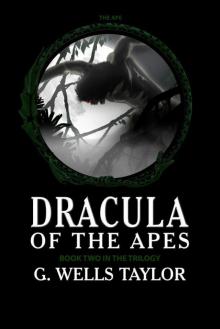 Dracula of the Apes 2
Dracula of the Apes 2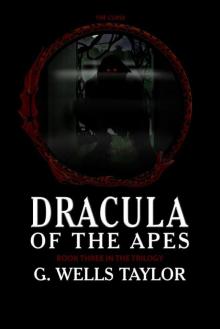 Dracula of the Apes 3
Dracula of the Apes 3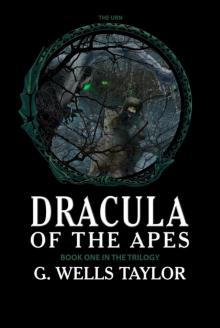 The Urn
The Urn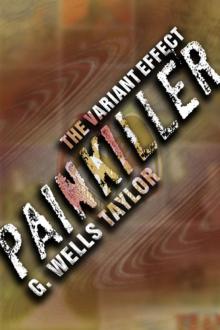 Painkiller
Painkiller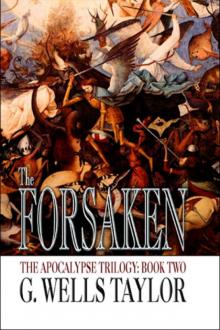 The Forsaken - The Apocalypse Trilogy: Book Two
The Forsaken - The Apocalypse Trilogy: Book Two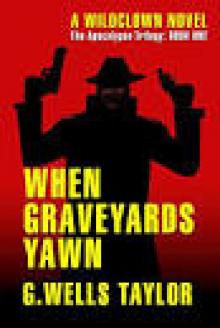 When Graveyards Yawn
When Graveyards Yawn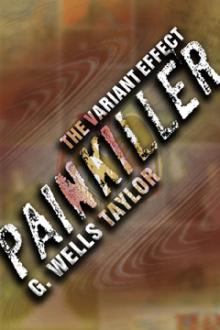 The Variant Effect: PAINKILLER
The Variant Effect: PAINKILLER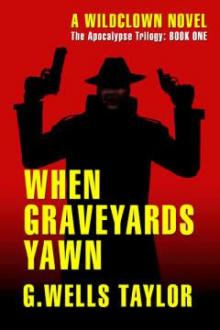 When Graveyards Yawn ta-1
When Graveyards Yawn ta-1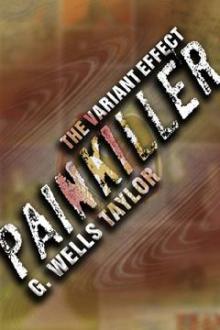 Painkiller tve-2
Painkiller tve-2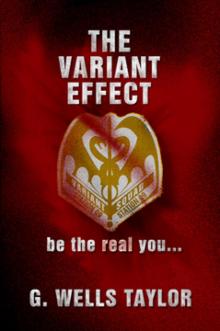 The Variant Effect
The Variant Effect